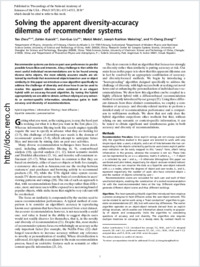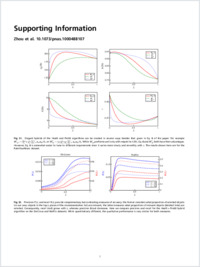Solving the apparent diversity-accuracy dilemma of recommender systems
- Zhou, Tao Department of Physics, University of Fribourg, Switzerland - Department of Modern Physics and Nonlinear Science Center, University of Science and Technology of China, Hefei, China - Research Center for Complex Systems Science, University of Shanghai for Science and Technology, Shanghai, China - Web Sciences Center, University of Electronic Science and Technology of China, Chengdu, China
- Kuscsik, Zoltán Department of Physics, University of Fribourg, Switzerland - Department of Theoretical Physics and Astrophysics, P. J. Šafárik University, Košice, Slovak Republic
- Liu, Jian-Guo Department of Physics, University of Fribourg, Switzerland - Department of Modern Physics and Nonlinear Science Center, University of Science and Technology of China, Hefei, China - Research Center for Complex Systems Science, University of Shanghai for Science and Technology, Shanghai, China
- Medo, Matúš Department of Physics, University of Fribourg, Switzerland
- Wakeling, Joseph Rushton Department of Physics, University of Fribourg, Switzerland
- Zhang, Yi-Cheng Department of Physics, University of Fribourg, Switzerland - Research Center for Complex Systems Science, University of Shanghai for Science and Technology, Shanghai, China
-
22.02.2010
Published in:
- Proceedings of the National Academy of Sciences. - 2010, vol. 107, no. 10, p. 4511-4515
English
Recommender systems use data on past user preferences to predict possible future likes and interests. A key challenge is that while the most useful individual recommendations are to be found among diverse niche objects, the most reliably accurate results are obtained by methods that recommend objects based on user or object similarity. In this paper we introduce a new algorithm specifically to address the challenge of diversity and show how it can be used to resolve this apparent dilemma when combined in an elegant hybrid with an accuracy-focused algorithm. By tuning the hybrid appropriately we are able to obtain, without relying on any semantic or context-specific information, simultaneous gains in both accuracy and diversity of recommendations.
- Faculty
- Faculté des sciences et de médecine
- Department
- Département de Physique
- Language
-
- English
- Classification
- Physics
- License
-
License undefined
- Identifiers
-
- RERO DOC 17542
- DOI 10.1073/pnas.1000488107
- Persistent URL
- https://folia.unifr.ch/unifr/documents/301635
Other files
Statistics
Document views: 164
File downloads:
- pdf: 522
- Supplementary material: 174

